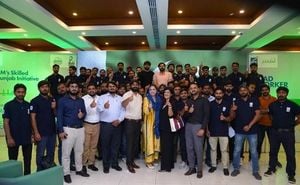Wikipedia, the world’s largest online encyclopedia, is facing its most serious internal challenge in years as its co-founder, Larry Sanger, has launched a sweeping and highly public critique of the platform’s editorial direction and governance. Sanger, who left Wikipedia in 2002 after co-founding it with Jimmy Wales, has published a detailed nine-point reform proposal, calling for dramatic changes to address what he describes as entrenched left-wing bias, opaque leadership, and a stifling of ideological diversity.
In a series of essays released on October 2, 2025, and in a high-profile appearance on Tucker Carlson’s podcast, Sanger laid out his grievances and recommendations, likening his effort to Martin Luther’s historic posting of the 95 Theses. According to Sanger, “Out of love for the truth and the desire to elucidate it,” Wikipedia now requires a fundamental rethinking to restore neutrality and trust. He made clear that, while he is “happy” about the proliferation of online encyclopedias—including Elon Musk’s newly announced Grokipedia—he remains deeply concerned about the direction Wikipedia has taken and the risk that new AI-driven projects might inherit similar flaws.
Sanger’s criticisms are not new, but the breadth and tone of his recent campaign mark an escalation. In interviews with Straight Arrow News and on his personal blog, he has accused Wikipedia of operating as an echo chamber, systematically excluding conservative voices through a sourcing blacklist that deems outlets like Fox News and Breitbart News unreliable. As Sanger explained to Straight Arrow News, “Fox News is considered unreliable and mostly unusable, while MSNBC is reliable.” He argues that this practice undermines the platform’s credibility and its original goal of presenting a truly neutral point of view.
One of the most contentious issues raised by Sanger is Wikipedia’s reliance on a consensus-based editorial process. In his first thesis, he calls for abandoning consensus as the primary method for resolving disputes, noting that it too often allows dominant factions to suppress minority or dissenting perspectives. “The community now effectively selects approved views as ‘consensus’ truth, often determined by the status of advocates, making it an adversarial game,” Sanger wrote. On Carlson’s podcast, Carlson himself remarked that consensus “allows an aggressive faction to overwhelm the skeptical faction.”
Sanger’s proposed solution is radical: allow for multiple, competing articles or perspectives on controversial topics, rather than forcing a single narrative. He points to early Wikipedia experiments with competing articles and suggests that modern tools—including AI and human rating systems—could facilitate a more pluralistic approach. “The goal is to acknowledge perspectives frankly and acknowledge humanity has many segments with distinct approaches to neutrality,” Sanger said. He described the current system as “a single, totalizing, intellectually imperialistic perspective.”
Another major focus of Sanger’s critique is the so-called sourcing blacklist. He argues that Wikipedia’s strict rules about what counts as a “reliable” source have led to the purging of conservative media and a narrowing of acceptable viewpoints. This, he claims, had real-world consequences, such as skewed coverage of the Hunter Biden laptop scandal. At the time, the New York Post—whose reporting broke the story—was deemed unreliable, and corroborating conservative sources were also blacklisted. This led Wikipedia to present the story as probable Russian disinformation, a framing later contradicted by subsequent reporting.
“Bias is built into the system,” Sanger asserts, noting that the current policy requires presenting only “significant” views and dismisses minority perspectives as less valid. He cites Wikipedia’s handling of topics like the grooming gangs scandal, Antifa, and GamerGate as further evidence of systemic bias. Sanger also criticizes the site’s “Movement Strategy,” influenced by consultants with ties to the Clinton Foundation, for promoting Wikipedia as a bulwark against online misinformation rather than a neutral arbiter of facts.
In his reform theses, Sanger calls for restoring Wikipedia’s original neutrality policy, which held that “when an article mentions a topic of controversy, it should be impossible to tell what position the article authors take on the controversy.” He acknowledges that this standard has been eroded in favor of presenting only the views deemed significant by the editorial consensus—often, in his view, the progressive or establishment perspective.
Sanger’s proposals extend beyond editorial policy to the very structure of Wikipedia’s governance. He calls for ending the anonymity of the so-called “Power 62”—the small group of bureaucrats, administrators, and arbitrators who wield significant control over the site. While supporting anonymity for ordinary editors as a protection for free speech, Sanger believes those with substantial authority should be publicly identified or, at minimum, known to a trusted independent body. “Knowledge is power. Yet the most powerful editors on the world’s single most powerful information platform? They are anonymous,” he wrote. He suggests the Wikimedia Foundation could provide legal and financial protections for these individuals, but insists that accountability is essential.
Other reform points include removing the controversial “Ignore all rules” policy, which Sanger says has been abused to shield insiders from accountability and to excuse bad behavior. He also advocates for a public rating system for articles—something Wikipedia briefly experimented with in the early 2010s—which would allow readers and outside experts to provide feedback on content quality. Sanger believes such a system, possibly modeled on X’s Community Notes or Stack Exchange, could make Wikipedia less insular and more responsive to legitimate criticism.
On the matter of bans, Sanger argues that indefinite bans should be rare and subject to more rigorous checks and appeals. He points to evidence that right-leaning editors are disproportionately sanctioned and notes the distress such bans can cause, referencing the case of the editor who created the famous “citation needed” tag and later contemplated suicide after being indefinitely banned. Sanger also highlights the controversial ban of the administrator “Fram,” which sparked an editor revolt and, in his view, exemplifies the arbitrary exercise of power by Wikipedia’s leadership.
Finally, Sanger calls for the creation of democratic governing institutions within Wikipedia, with transparent membership and the authority to enact meaningful policy changes. He concedes that such reforms are unlikely to be adopted without significant external pressure, given what he describes as Wikipedia’s evolution into a self-perpetuating oligarchy. “I always thought of Wikipedia as essentially democratic,” Sanger reflects, but now believes only a “constitutional convention” or similar overhaul can restore its legitimacy.
While Sanger holds out little hope for internal reform, he remains optimistic about the potential for competition and innovation in the online encyclopedia space. He has welcomed Elon Musk’s announcement of Grokipedia, an AI-driven rival being built by xAI, but warns that AI systems are also susceptible to bias. Sanger told Straight Arrow News that Grok, xAI’s chatbot launched in November 2023, quickly developed a left-leaning bias, especially on political and cultural issues. “It’s pretty annoying, unless you actually support that,” he observed. He urges Musk and the xAI team to design their platform carefully to avoid replicating the same problems he sees at Wikipedia.
For now, Sanger’s reform theses have sparked renewed debate about the future of Wikipedia and the role of online encyclopedias in shaping public understanding. Whether his “Hail Mary proposal” will lead to meaningful change remains to be seen, but his call for greater transparency, diversity, and accountability has resonated with critics across the ideological spectrum.
As the encyclopedia world enters a new era of AI-driven competition and intensifying scrutiny, the battle over neutrality and truth is far from over.




